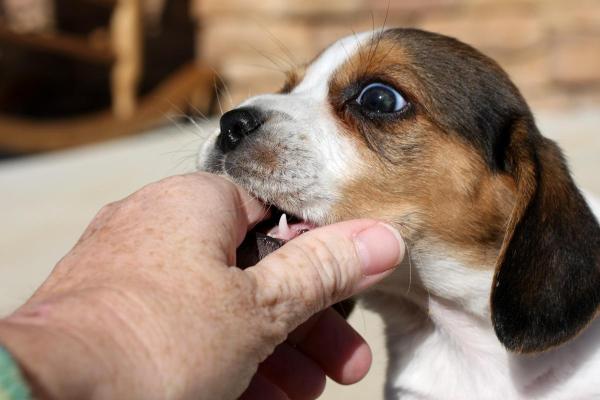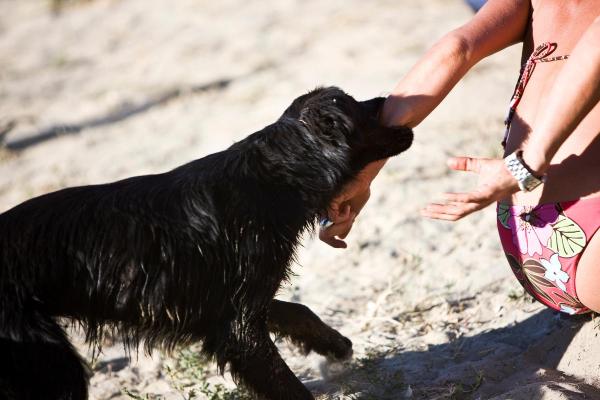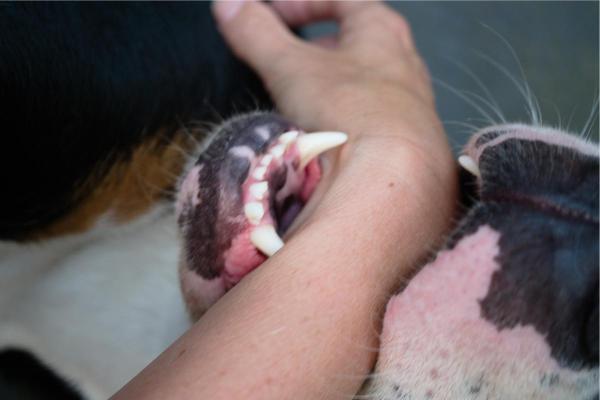
Witnessing our dogs thoroughly enjoy playtime, particularly during their youthful years when they possess boundless energy, brings us immense joy. However, there may be instances when we observe peculiar behaviors in our beloved canines that raise concerns, particularly if they seem linked to complex behavioral issues like aggression. For instance, you might be curious about why your dog playfully grabs your arm with their mouth or engages in gentle biting.
In the following article from AnimalWised, we examine the primary reasons behind your dog's mouthing behavior and provide guidance on how to manage it effectively.
Exploratory behavior
If you find yourself wondering why your adorable puppy is enthusiastically grabbing your arm, worry not! This behavior is quite common among puppies. During the initial stages of their lives, puppies naturally exhibit a range of exploratory behaviors. These behaviors allow them to interact with their environment, stimuli, and the individuals, including you and other family members.
It's no surprise that puppies are more inclined to mouth or gently bite various objects, including their guardians' arms, hands, or even feet during playtime. This behavior is a natural and expected part of their physical, cognitive, and sensory growth and development. It holds true for dogs of all breeds, sizes, and colors. As responsible pet owners, it is crucial not to suppress or scold this exploratory behavior. Such behavior is inherent to the nature and essence of dogs.
What to do?
Instead, our focus should be on redirecting this behavior towards more appropriate outlets, ensuring that our puppies can grow and thrive safely without causing any unintentional harm to their family or home.
Moreover, it is essential to avoid premature separation of puppies from their mother and siblings. Waiting for the completion of the weaning period is crucial. During the early weeks of a puppy's life, the mother plays a vital role not only in providing nourishment, but also in teaching them the fundamentals of social behavior and canine communication.
This early learning period is essential in preventing future learning and behavioral issues in adulthood, including the development of aggression-related behaviors during play. For further guidance on this matter, we recommend reading our other article on why does your dog bite you while playing.
Teething
It's essential to understand that puppies go through two significant teething periods during their early years. When they are newborns, they develop their first set of temporary or primary teeth, which eventually fall out to make way for the eruption of their permanent teeth that are suited for adult dog nutrition.
During both teething phases, with a particular emphasis on the second one, puppies may experience discomfort or pain, leading them to seek relief by biting various objects, including your arm or hands, whether during play or other interactions.
What to do?
This behavior can be attributed to the natural process of teething that puppies undergo as they grow. It's crucial not to scold them for trying to alleviate the discomfort they experience. Instead, it's important to provide them with suitable outlets to cope with their teething woes.
When dealing with a teething puppy that incessantly bites everything in an attempt to relieve the discomfort, offering teething toys or teethers that they can safely chew on is highly recommended. Keep a close eye on your puppy while they are chewing on toys or other objects to ensure their safety. Redirect their attention if they start chewing on inappropriate items, and replace them with an appropriate toy.
You can also offer your teething puppy frozen treats such as homemade ice cubes made from low-sodium broth or frozen fruits (safe for dogs), The coldness helps numb their gums and provides temporary relief. Always ensure the treats are safe and suitable for dogs.
Do not forget to regularly clean the teething toys and objects your puppy chews on to maintain good hygiene and prevent any potential infections. For more comprehensive information on relieving tooth pain in dogs, we invite you to read our detailed article on the topic.
[ltmbox id="zafSw4iQ" label="Click Here to Buy a Puppy Chewing Toy"]

Accidental reinforcement
If your dog playfully grabs your arm or bites you, it is likely because you unintentionally taught them as a puppy that these behaviors are acceptable and even enjoyable. For instance, if you found it cute or harmless when your puppy bit or mouthed you during play or interactions, and allowed it to happen repeatedly, they may have learned that this is an acceptable way to engage with you.
The problem arises as the puppy grows into an adult dog with a stronger bite, yet still believes that biting and grabbing are acceptable behaviors. This becomes a concern when they haven't learned the boundaries of play, as you unintentionally reinforced these behaviors throughout their childhood.
What to do?
Our best advice is to avoid encouraging behaviors in your puppy that you don't want to see carried over into adulthood. If you don't want your dog to playfully bite or grab your arm, avoid using your hands or feet as toys in pretend hunting games, and don't allow your arm to become a chew toy for your pup. Instead, provide appropriate toys and teethers suitable for their size and age, and create an enriched environment where they can safely expend energy and explore their senses.
It is also important to monitor your dog's biting pressure. If they apply excessive force, make a high-pitched yelp or a soft "ouch" sound to indicate pain, then immediately withdraw your attention for a few moments. This helps them learn that biting too hard results in the end of playtime.
Conversely, when your dog plays with you in a friendly manner without causing harm or displaying any aggression, remember to reward them with a treat to reinforce the desired behavior and further encourage positive interactions. For more comprehensive advice on teaching a puppy not to bite, we recommend consulting our other article.
Socialization problems
Proper socialization is crucial for puppies to learn how to interact harmoniously with various environments, individuals, and stimuli. Insufficient or incorrect socialization can lead young and adult dogs to react by resorting to biting in certain situations.
Ideally, you should initiate the socialization process for your puppy during their early months of life, preferably before the third or fourth month. This period marks the end of the critical socialization phase, during which they develop the ability to recognize friendly species.
Effective early socialization is crucial for fostering confidence and promoting stable behavior in puppies. It helps them develop the necessary skills to navigate their environment, interact with others, and resort to aggression only in extreme circumstances.
If your puppy missed out on proper socialization during their early years, don't worry. It's never too late to socialize a dog. Socializing an adult dog can be a rewarding process, although it may require additional patience and effort compared to socializing a young puppy. To help you with this endeavor, we invite you to consult our comprehensive guide on socializing an adult dog. This resource provides valuable insights and practical tips to assist you in the socialization process.
Need for attention
Dogs have various ways of capturing our attention, including vocalizations, gestures, and direct actions. These behaviors, such as barking, nudging with their snouts, grabbing our arms with their mouths, or pawing at us, are often indicators that our dogs have a specific request or urgent need.
For example, if your dog is hungry, they may bark to communicate their desire for food. If they need to relieve themselves, they might show you their leash and collar as a signal that they need to go outside. In situations where they have been alone for a while and you return without giving them attention, they may resort to grabbing your arm with their mouth to initiate play or spend quality time with them.
What to do?
To address this behavior, it is important to address the underlying needs of your dog. In the short term, providing the necessary resources to fulfill their specific needs, such as feeding them when they are hungry, is essential to restore their well-being.
However, for long-term solutions, it is crucial to anticipate and fulfill your dog's basic needs to ensure a good quality of life and reduce their frequent attempts to seek attention. Here are some tips to consider:
- Establish a regular eating routine: determine the appropriate amount of food, number of daily meals, and feeding times for your dog. This will prevent hunger-related discomfort and the need for them to constantly ask for food.
- Maintain a consistent daily walking routine: regular walks help manage your dog's weight, promote stable behavior both indoors and outdoors, and reduce the need for attention-seeking behaviors associated with the need for exercise and elimination.
- Spend quality time with your dog: your love, affection, and companionship are vital for your dog's well-being. Loneliness can have negative effects on their behavior and overall health.
By addressing your dog's needs and providing a fulfilling environment, you can help them develop balanced and friendly behavior, reducing their reliance on attention-seeking behaviors.

Stress
Another reason why your dog may grab your arm with their mouth or bite you without an apparent reason is when they are feeling stressed and need to release accumulated tension. This can manifest as unusual behaviors, destructive tendencies, or even signs of aggression in more severe cases, particularly when chronic stress is involved.
Dogs can experience stress for various reasons, but it is more common in dogs that lead a sedentary lifestyle or spend significant time alone in an environment lacking enrichment. In such environments, they may struggle to find positive outlets to relieve tension and engage their body and mind while being alone.
It's important to note that stress not only affects a dog's behavior negatively, but also impacts their overall health, making them more susceptible to various illnesses.
What to do?
To effectively tackle stress and mitigate the risks associated with a sedentary lifestyle, it is essential to focus on environmental enrichment for your dog.
It is critical to create a stimulating environment in your home with a diverse range of toys, stimuli, and resources. These will capture your dog's interest and provide them with opportunities for exercise and entertainment, especially when you are unable to personally take them for walks or play with them.
If you're unsure how to get started, we have another article that provides guidance on environmental enrichment for dogs and offers practical tips on how to implement it in your home.
Aggressiveness
Firstly, it is important to clarify that aggression is not a natural behavior or inherent trait of any dog. It is a complex behavioral problem that can stem from various causes, including inadequate socialization, exposure to violence or stress, underlying health issues, pain, or neurological conditions that affect the dog's behavior.
If you suspect that your dog is displaying signs of aggression, the first step is to take them to a veterinarian to rule out any underlying medical conditions and determine if treatment is necessary.
Additionally, seeking assistance from a canine behavior specialist or trainer with expertise in ethology is recommended. They can evaluate your dog's behavior and history and provide guidance tailored to their specific needs. Do not miss this other article, where we also offer valuable tips for dealing with an aggressive dog.

If you want to read similar articles to Why Does My Dog Gently Mouth My Hand?, we recommend you visit our Behavioral problems category.